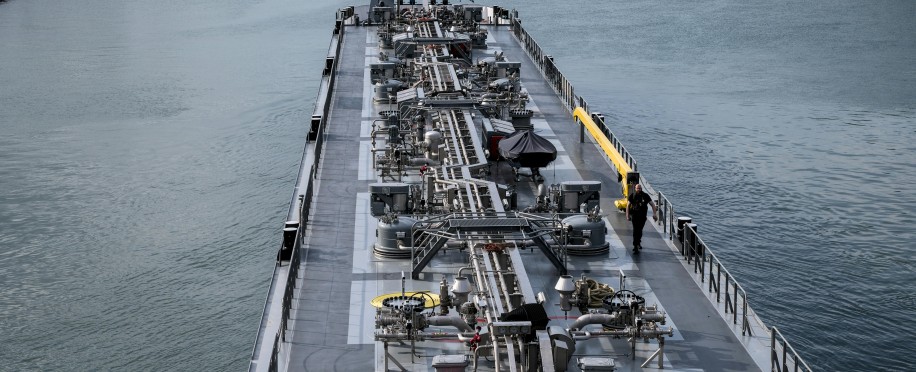Copyright © 2026 lmitac.com All Rights Reserved. Contact - Terms and Conditions - Privacy Policy - Quality Policy - Become an instructor - Vacancies - Sitemap
London Maritime Academy is a trade name for London Premier Groupversion: 2.9.0
London Maritime Academy is a trade name for London Premier Group

Posted on : 10/19/2025, 9:35:26 PM
Last Update : 10/19/2025, 9:35:26 PM
LNG operations are essential to the maritime sector, not only because they provide a cleaner and more sustainable power resource, but also due to their economic impacts on maritime shipping services and the entire industry.
Moreover, LNG operations mean that large volume ships will transport cooled and liquefied natural gas (LNG) between facilities with a high safety level to ensure that this LNG is delivered to all locations, even the ones without pipelines.
In this article, we will share with you some amazing information about LNG operations, the main components of LNG operations, and the reasons why you need professional LNG operations and facilities training.
Let us start with some details about the liquefied natural gas (LNG) operations in general, as LNG is natural gas (methane) that has been liquified, cooled, stored, and transported via LNG ships to needed facilities and ports.
However, from a maritime industry perspective, liquefied natural gas (LNG) operations involve using, managing, and transporting liquefied natural gas (methane) in the best possible way to achieve lower emission rates, with better safety, sustainability, and efficiency in power production.
Furthermore, the liquefied natural gas (LNG) operations in the maritime industry include different stages or steps, like loading liquefied natural gas or transporting the liquefied natural gas (LNG) on specialised LNG carriers based on the latest natural gas management and safety standards.
Professional LNG operations training London is your efficient training opportunity to learn all that you need about liquefied natural gas (LNG) operations, safety standards, management of storage facilities, and more.
Furthermore, even if you are not in London, you can get the perfect maritime training with one of London Maritime Academy's regional offices in Dubai, Rotterdam, Athens, Istanbul, or Hamburg.
Liquefied natural gas (LNG) operations training covers all the needed details about an LNG ship, with information about safety standards, storage operations, methane handling, and temperature control during loading, shipping, and unloading.
Students of liquefied natural gas (LNG) operations courses learn how to manage LNG storage, transport, and efficient regasification processes with modern safety liquefied natural gas procedures and advanced systems.
Professional liquefied natural gas (LNG) operations training will for sure introduce you to the commercial side of LNG, including pricing strategies, contracts, and other dynamics to help you understand how related logistics and regulations affect the liquefied natural gas (LNG) operations.
It is highly important to understand the legal part of LNG operations on a ship, storage, or port, to be ready to follow the needed safety standards, emergency responses, and environmental protection measures effectively without impacting your maritime business or revenue.

As we said, LNG is natural gas or methane that is liquefied and cooled in LNG facilities to be used in the production of clean power. This production service includes many steps; thus, getting LNG training courses is important for safety and more.
In an industry like the maritime industry, you need every opportunity to develop and reach higher roles, and that is exactly what LNG operations training does for your career.
This liquefied natural gas (LNG) operations training equips professionals with specialised knowledge in LNG facilities, operations, storage procedures, and safety standards to keep them effectively competitive in the job market.
Usually, liquefied natural gas (LNG) operations courses focus on real-world applications like liquid gas handling, safety drills, and equipment operations, which are all necessary to work with confidence in complex LNG services and environments.
Despite the LNG operation you are responsible for, you need to gain efficient technical training about all necessary liquefied natural gas (LNG) operations.
This includes learning about the science, systems, and technologies behind volume, liquefaction, storage, and regasification to understand and manage every stage of the liquefied natural gas (LNG) value chain effectively.
Even in the largest LNG ship, the most important thing is safety; therefore, these liquefied natural gas (LNG) operations courses teach attendees how to optimise performance while reducing risk rates of methane gas, cooled storage, and other steps included in the operations on ships, ports, or terminals.
Liquefied natural gas (LNG) operations training provides a clear understanding of international laws, safety standards, and best practices in all required operations.
This can help maritime professionals operate effectively and deliver cooled and liquefied gas even in the strictest regulatory frameworks while maintaining global safety standards.
Liquefied natural gas (LNG) operations are very important operations and services in the energy management sector, including actions of production, storage, transport, and use of the liquefied natural gas (LNG) in maritime facilities and ships.
Thus, you need to make sure to get the best maritime training in a reliable maritime academy with accredited certifications and expert tutors.